U.S. Army Signal Corps photograph in the John F. Kennedy Presidential Library, Boston
JFK’s legacy at 50
HKS, IOP mark inauguration with emphasis on public service
At a mere 1,355 words, John F. Kennedy’s first speech as president took just 14 minutes to read. Delivered the morning of Jan. 20, 1960 (“cold but brilliant,” according to one news report), his inaugural address ranked as one of the shortest on record — and to many, one of the most memorable.
The speech was an immediate hit. “The mood and emphasis were dedicatory and determined; the language, widely praised for eloquence,” The New York Times declared at the time. The address’s most famous line exhorted a generation to pursue careers and lives guided by public service.
“My fellow Americans,” Kennedy intoned, “ask not what your country can do for you — ask what you can do for your country.”
Fifty years later, the Harvard Kennedy School (HKS) and the Institute of Politics (IOP) are honoring the spirit of Kennedy’s oft-cited challenge with a series of events designed to highlight the importance of public service.
“President Kennedy called people to really take responsibility for something larger than themselves, to contribute to something larger than themselves,” said Melodie Jackson, HKS’s associate dean for communications and public affairs. “It seems to resonate with people. The commitment to public service that he stood for is very much alive and still present here at the Kennedy School.”
Today (Jan. 20) at noon, the school will host a reading of the inaugural address in the John F. Kennedy Jr. Forum at 79 JFK St.
On a broader scale, HKS, IOP, and the John F. Kennedy Library Foundation are launching JFK50.org, a website that will host interviews with public figures about Kennedy, slideshows, and other archival materials. Among the Kennedy School’s contributions to the site is a video (above) of notable figures such as former Secretary of State Colin Powell, former British Prime Minister Gordon Brown, and Liberian President Ellen Johnson Sirleaf, M.P.A. ’71, reading the inaugural address.
“We interviewed people of a whole variety of ages, and young or old, everyone had something to say about the way in which President Kennedy directly had an impact on their lives,” Jackson said, adding: “As Kennedy’s namesake, and as an institution dedicated to public service, we felt it was important to pay tribute both to his impact and [to] his lasting legacy.”
Other events honoring the Kennedy inauguration:
- Last night (Jan. 19), the IOP hosted a panel discussion in Washington, D.C., “Answering President Kennedy’s Call to Service: The Next Generation,” moderated by new IOP director and former Kentucky Secretary of State Trey Grayson and featuring a wide range of speakers in the public sector. Caroline Kennedy, John F. Kennedy’s daughter and president of the JFK Library Foundation, also spoke at the event.
- The anniversary also spurred collaboration between the IOP and the U.S. Conference of Mayors. In the two weeks leading up to the anniversary, more than 100 mayors around the country spoke to students in their communities about the meaning of Kennedy’s inaugural address and how young people can serve their communities.
- From Jan. 18 to Feb. 6, the Kennedy Center in Washington, D.C., is hosting a three-week series of events and performances to commemorate Kennedy as a leading patron of the arts. A calendar of events celebrating the 50th anniversary can be found here.
For future events celebrating the 50th anniversary of the Kennedy presidency, visit the Harvard Kennedy School and the Institute of Politics websites. Kennedy graduated from Harvard College in 1940.
Share this article
John F. Kennedy 50th anniversary
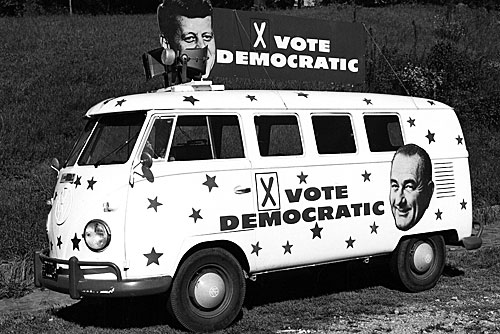
Vote democratic
The campaign wagon of the State Campaign Committee of Alabama during the 1960 presidential campaign. Photo courtesy of the John F. Kennedy Presidential Library and Museum, Boston
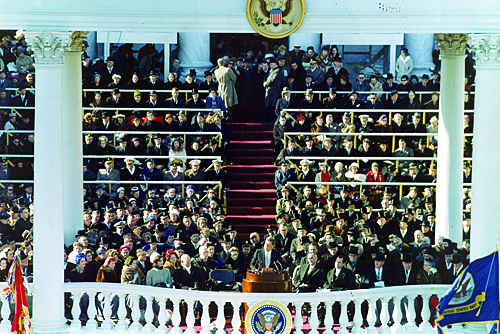
Inaugural address
A view of the inaugural address of John F. Kennedy, 35th president of the United States, Washington, D.C., Jan. 20, 1961. Photo courtesy of the U.S. Army Signal Corps photograph in the John F. Kennedy Presidential Library, Boston

Meeting of the minds
A meeting between the Executive Committee of the National Security Council featuring President Kennedy, Secretary of Defense Robert McNamara, and Deputy Secretary of Defense Roswell Gilpatric in the White House’s Cabinet Room. Photo courtesy of Cecil Stoughton, White House/John Fitzgerald Kennedy Library, Boston
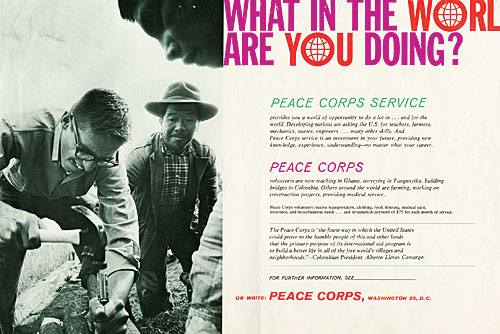
What in the world are you doing?
An early brochure for the Peace Corps.
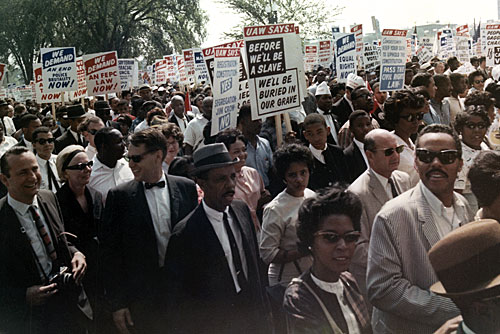
March on
A view of the famous March on Washington on Aug. 28, 1963. Photo courtesy of Cecil Stoughton/White House, John F. Kennedy Presidential Library and Museum, Boston
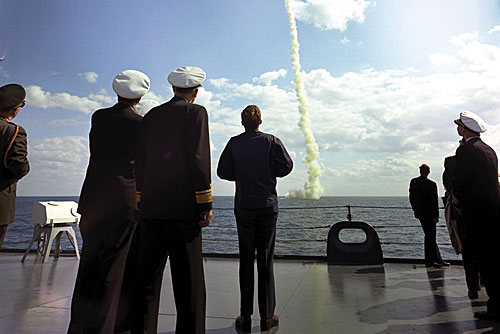
Firing off
President John F. Kennedy observes the firing of a Polaris missile by the Submarine Andrew Jackson aboard the U.S.S. Observation Island off the coast of Florida. Photo courtesy of Robert Knudsen, White House/John F. Kennedy Presidential Library and Museum, Boston




